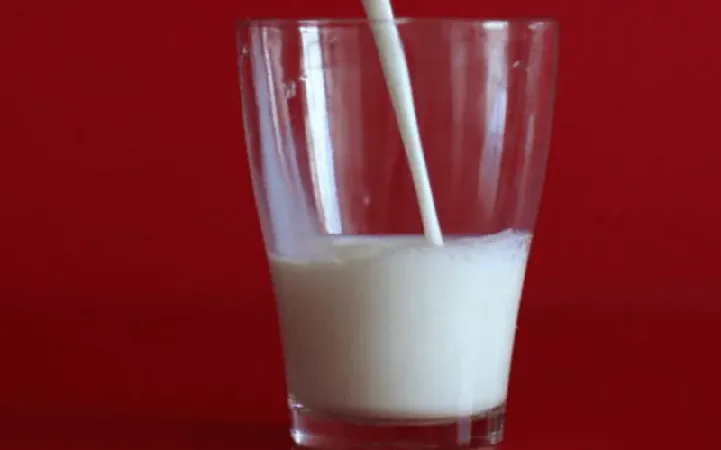
Is Your Daily Glass of Milk the Secret Weapon Against Bowel Cancer? New Study Reveals Shocking Findings!
2025-01-12
Author: Wei Ling
Groundbreaking Research on Milk and Bowel Cancer Risk
A groundbreaking new study has uncovered that simply drinking a glass of milk each day could potentially reduce your risk of bowel cancer—the third most common cancer worldwide—by an impressive 20%. With the alarming rise in cases, especially among younger adults, experts are calling attention to milk's protective nutrients as a proactive measure for prevention.
Understanding Bowel Cancer
Bowel cancer, also referred to as colorectal cancer, starts in the large bowel (colon) or the back passage (rectum). Conducted as part of the Million Women Study, this research, which appears in the prestigious journal Nature Communications, monitored the dietary habits and cancer risk of 542,778 women over nearly 17 years. Over this span, 12,251 participants were diagnosed with bowel cancer, making this one of the largest studies examining the connection between diet and disease.
Key Findings of the Study
The results were striking: for those who increased their calcium intake by just 300 mg per day—equivalent to a 240 ml glass of milk or two pots of yogurt—there was a remarkable 17% decrease in bowel cancer risk. This study emphasized that calcium, regardless of its source—be it dairy or non-dairy—offers similar protective effects, signifying that the mineral itself is the key player in this health battle.
Sources of Calcium
Beneficial sources of calcium identified include milk, yogurt, certain vegetables, and even calcium in beverages like tea and coffee. However, the research did not delve into the effects of calcium supplements, and evidence regarding cheese and ice cream was inconclusive, possibly due to lower consumption among the participants.
How Calcium Protects Against Bowel Cancer
According to researchers, calcium may protect against bowel cancer by binding to bile acids and free fatty acids in the colon—two compounds known to contribute to cancer development. Moreover, animal studies suggest that higher calcium intake can help maintain the structural integrity of the bowel, further supporting its defense against potential malignancies.
Detrimental Factors
While calcium emerged as beneficial, the study also shed light on detrimental factors. Daily alcohol consumption equivalent to 20 grams (about a medium glass of wine or a pint of beer) was linked to a 15% increase in bowel cancer risk. Additionally, consuming 30 grams more of red or processed meat per day raised the risk by 8%.
Expert Opinions
Dr. Keren Papier, the study's lead researcher, characterized this as the most comprehensive investigation into diet and bowel cancer to date, stating, "This research highlights calcium’s protective role in reducing bowel cancer risk."
Sophia Lowes, Senior Health Information Manager at Cancer Research UK, emphasized the significance of prevention, noting the alarming prevalence of bowel cancer in the UK. She stated, “Maintaining a balanced diet, avoiding smoking, and reducing alcohol and red or processed meat intake are crucial. Dairy products, including milk, can definitely be part of a diet that minimizes bowel cancer risk.”
Global Context and Prevention Strategies
Globally, nearly 2 million cases of bowel cancer are diagnosed each year, leading to 1 million deaths. Projections indicate that by 2040, cases could skyrocket to 3.2 million. Disturbingly, the rise of bowel cancer among younger populations is particularly alarming, with causes still being investigated. However, experts estimate that more than half of bowel cancer cases could be prevented through lifestyle and dietary adjustments.
Additional strategies to mitigate risk include upping fiber intake, staying physically active, minimizing alcohol consumption, and decreasing processed meat consumption. This latest research reinforces the idea that calcium—especially from milk—could play a vital role in combating this devastating disease.
Factors Contributing to Bowel Cancer Risk
Factors contributing to colorectal cancer's development include lifestyle choices, genetic influences, and environmental exposures. Diets rich in red and processed meats, low in fiber, and high in alcohol consumption are significant risk factors. Additionally, chronic conditions like inflammatory bowel disease (IBD) can exacerbate the likelihood of cancer.
Conclusion and Recommendations
Emerging evidence points to shifting lifestyle habits, including poorer dietary choices and inactivity, as significant contributors to the increasing incidence of bowel cancer among younger individuals. Thus, it’s crucial to implement preventive measures, such as consuming a balanced diet, maintaining physical activity, and participating in regular screenings.
Calcium is believed to offer protection in several impactful ways:
Ways Calcium Aids Protection Against Bowel Cancer
1. Binding to harmful compounds: Calcium can bind to bile acids and free fatty acids, neutralizing them and reducing their cancer-causing potential.
2. Maintaining bowel structure: Animal studies suggest calcium supports the structural integrity of the bowel lining, safeguarding against damage that can lead to cancer.
3. Regulating cell growth: Calcium may play a role in controlling cell division, preventing the uncontrolled proliferation that leads to tumor formation.
4. Combating inflammation: Additionally, milk contains other beneficial nutrients like vitamin D, which works alongside calcium to foster a healthy gut environment—chronic inflammation is a known risk factor for bowel cancer.
5. Enhancing gut health: Many milks are fortified with probiotics, which can promote gut health and create a balanced microbiome—a factor associated with reduced colorectal cancer risk.
As research continues to unveil the intricate connections between diet and cancer, this study serves as a beacon of hope and a call to action. So, is your daily glass of milk a simple yet effective way to protect yourself from bowel cancer? The compelling evidence suggests it might just be the health boost you need!
 Brasil (PT)
Brasil (PT)
 Canada (EN)
Canada (EN)
 Chile (ES)
Chile (ES)
 Česko (CS)
Česko (CS)
 대한민국 (KO)
대한민국 (KO)
 España (ES)
España (ES)
 France (FR)
France (FR)
 Hong Kong (EN)
Hong Kong (EN)
 Italia (IT)
Italia (IT)
 日本 (JA)
日本 (JA)
 Magyarország (HU)
Magyarország (HU)
 Norge (NO)
Norge (NO)
 Polska (PL)
Polska (PL)
 Schweiz (DE)
Schweiz (DE)
 Singapore (EN)
Singapore (EN)
 Sverige (SV)
Sverige (SV)
 Suomi (FI)
Suomi (FI)
 Türkiye (TR)
Türkiye (TR)
 الإمارات العربية المتحدة (AR)
الإمارات العربية المتحدة (AR)